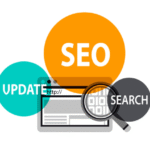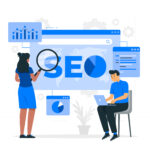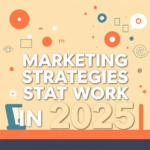In the world of digital marketing, few debates are as relevant as SEO vs PPC. Both are powerful strategies for driving traffic and generating leads, yet they work very differently. While many marketers pit them against each other, the truth is that PPC and SEO marketing work best when used together.
In this guide, we’ll break down the pros and cons of PPC and SEO, explain when to use each, and show you how combining them can maximize your ROI in 2025.
What is SEO?
Search Engine Optimization (SEO) is the process of improving your website to rank higher in organic search results. It focuses on earning traffic naturally, without paying for every click.
Elements of SEO:
- Keyword research: Finding what your audience searches for
- Content optimization: Writing engaging, keyword-rich, and valuable content
- Technical SEO: Improving site speed, structure, and mobile performance
- Backlink building: Earning quality links from authoritative websites
- Local SEO: Optimizing for location-based searches
SEO is a long term investment that builds credibility and visibility over time.
What is PPC?
Pay-Per-Click (PPC) advertising is a paid strategy where you pay a fee every time someone clicks your ad. It’s the quickest way to appear at the top of search results for your chosen keywords.
Popular PPC Channels:
- Google Ads (Search, Display & Shopping campaigns)
- Microsoft Advertising (Bing Ads)
- Social media platforms like Facebook, Instagram & LinkedIn
PPC helps you target specific audiences, test ad variations, and drive instant traffic—making it ideal for fast-moving campaigns.
Also read: SEO Trends for 2025
SEO vs PPC: Understanding the Difference
| Feature | SEO | PPC |
|---|---|---|
| Traffic Source | Organic (unpaid) | Paid (ad-based) |
| Cost | Free clicks (after optimization) | Pay per click |
| Time to Results | Long-term (3–6 months) | Immediate |
| Longevity | Sustainable | Stops when ads stop |
| CTR | Often higher for informational searches | Higher for commercial intent |
| Control | Algorithm-dependent | Fully controllable |
Both PPC and SEO are essential pillars of a complete digital marketing strategy the key is knowing when to use which.
Pros and Cons of SEO
| Pros of SEO | Cons of SEO |
|---|---|
| Long-Term ROI: Once you rank, traffic continues with little ongoing cost. | Takes Time: It can take 3–6 months (or more) to see meaningful results. |
| Builds Credibility & Trust : Organic results are viewed as more reliable by users. | Algorithm Dependence: Google updates can impact your rankings overnight. |
| Sustainable Traffic Growth : Consistent, evergreen traffic without ad spend. | Uncertain Results: Even with proper optimization, ranking isn’t guaranteed. |
| Higher Click-Through Rates (CTR): Organic listings often earn more clicks for informational searches. | Ongoing Effort Needed: Requires continuous content and technical optimization. |
| Cost-Effective in the Long Run: No per-click cost after initial setup and optimization. | High Competition: Difficult to rank for highly competitive keywords. |
When to Use SEO
- You’re building long term digital growth
- You want to increase brand authority
- You’re working with a limited budget
- You want to target evergreen content
- Your sales process is research driven or B2B
Also Read: The Future of SEO.
Pros and Cons of PPC
| Pros of PPC | Cons of PPC |
|---|---|
| Instant Results : Get traffic and visibility immediately after launch. | Can Be Expensive : Costs rise quickly in competitive industries. |
| Precise Targeting: Target by demographics, location, time, device, and more. | Short-Term Impact : Traffic stops as soon as ads are paused. |
| Full Control: Set budgets, adjust bids, and control ad placements anytime. | Ad Fatigue & Banner Blindness : Users may ignore ads over time. |
| A/B Testing Flexibility : Easily test headlines, CTAs, and landing pages. | Requires Constant Monitoring : Performance drops if campaigns aren’t optimized. |
| Visibility for Competitive Keywords : Appear on top even if you can’t rank organically. | Click Fraud Risks : Competitors or bots can waste ad spend despite platform filters. |
When to Use PPC
- You need instant traffic and conversions
- You’re launching a new product or website
- You want to target high intent commercial keywords
- You’re running limited time promotions
- You’re testing ad copy or landing pages
Integrating PPC and SEO for Maximum ROI
Instead of viewing SEO and PPC as mutually exclusive, combine them for a comprehensive strategy. Here’s how an integrated approach can benefit your business:
How PPC and SEO Work Better Together:
- Share Keyword Data: Use PPC insights to identify high-converting keywords for SEO.
- Double Your Visibility: Appear in both organic and paid results to dominate search pages.
- Retargeting Synergy: Use SEO for top-funnel awareness and PPC retargeting for conversions.
- Test Before Scaling: Use PPC A/B tests to validate ideas before writing long-form SEO content.
- Bridge SEO Gaps: Use PPC to drive traffic while your SEO rankings grow.
Final Verdict: PPC or SEO? Use Both.
The SEO vs PPC debate isn’t about choosing one over the other, it’s about balance.
- SEO builds credibility, trust, and long-term traffic.
- PPC delivers speed, precision, and measurable conversions.
Together, PPC and SEO marketing can create a full funnel strategy that drives awareness, engagement, and revenue.
Ready to Generate Maximum ROI with SEO & PPC?
Unlock the full potential of your digital marketing with a tailored PPC and SEO strategy by Allure Digital. Whether you’re planning for long term organic growth or immediate traffic through paid campaigns, our expert team crafts results-driven solutions that maximize your return on investment. We don’t just bring traffic, we bring conversions. From targeted keyword optimization to high converting ad campaigns, we ensure every dollar works harder for your business. Don’t leave growth to chance, partner with a team that knows how to deliver. Contact us today and start seeing real results.








